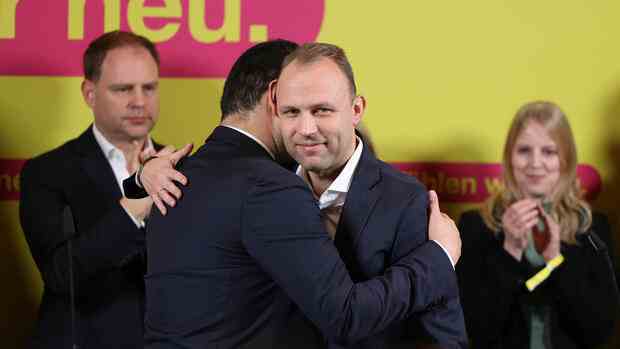Berlin On Sunday evening at 6.09 p.m. there is still a little bit of hope in the Hans-Dietrich-Genscher-Haus. FDP General Secretary Bijan Djir-Sarai enters the stage with Berlin’s top candidate, they clapped each other’s courage. In a forecast, the liberals are still five percent, would be tight in the Berlin House of Representatives. “I wish us all strong nerves for this evening,” says Czaja.
But the hope did not last long. In the hours after Djir-Sarai and Czaja’s appearance, it became increasingly clear that the FDP had been kicked out of the Berlin House of Representatives. The party only achieved 4.6 percent in the repeat election, in 2021 it was 7.1 percent.
You need strong nerves now, especially in the party leadership. For the FDP it is the fifth electoral defeat in a row since the federal election. In October she failed at the five percent hurdle in Lower Saxony. And in Schleswig-Holstein and North Rhine-Westphalia, the FDP was kicked out of the state governments in 2022. In Saarland she missed the leap into the state parliament.
The party refers to Berlin-specific reasons: many middle-class voters would have voted for the CDU in order to achieve a change in the Senate. But of course the question that has been on the party’s mind since the defeat in Lower Saxony is already being discussed on Sunday evening in the Genscher House: How high is the price that the FDP has to pay for the traffic light alliance in the federal government?
As a precautionary measure, Berlin’s top candidate Czaja pointed out on Sunday evening that they had fought “together with the federal party”, “we never hid the traffic light coalition”. On the evening of the defeat, however, the federal party was initially hidden. Politicians from the Berlin state association were on stage with Djir-Sarai and Czaja.
>> Read here: Seven lessons from the election to the House of Representatives
The presidency and federal board will discuss the outcome of the election on Monday morning. Here one had been sure until the end that the FDP would make it back into the House of Representatives. We wanted to avoid such a setback right at the beginning of the year.
CDU triumphs in election to the House of Representatives
How long will the party base remain quiet?
After the internal deliberations, FDP leader Christian Lindner will have to explain the defeat to Czaja in public. It will probably sound similar to the debacle in Lower Saxony: Lindner also admits that the traffic light is not the favorite coalition of FDP voters. And yet one must continue to govern solidly out of state political responsibility, the message has always been in the end.
The question is how long the liberal base can still be ordered to remain calm, how long other state associations can keep their nerves. There will be elections in Bremen in May, and this election has more or less already been ticked off by the party leadership. Traditionally, the FDP has little to gain in Bremen.
After the fifth election debacle in a row, the FDP leadership must discuss a new direction.
(Photo: dpa)
The autumn elections in Bavaria and Hesse will be decisive. Campaigners there warn that if the Liberals are also defeated here, they will hardly recover before the general election.
>> Read here: Fateful year for the liberals – an insecure FDP wants to encourage itself
“Bitter evening for the Liberals,” tweeted the Bavarian top candidate Martin Hagen on Sunday after it became apparent that the FDP would not make it into the Berlin House of Representatives. “The traffic light still doesn’t bring any tailwind,” he added.
Accordingly, there are demands from the party that you have to push through more in the traffic light coalition and work out your own positions more. “Of course, this also has consequences for Berlin,” said Secretary General Djir-Saai on Sunday evening. “The voice of the FDP within the traffic light must be clearer than before.”
Rough climate in the traffic light coalition
However, the FDP had been rougher in the traffic light coalition in recent weeks. They are blocking a number of legislative proposals by the coalition partners. When it comes to speeding up planning and approval processes, she gets into a dispute with the Greens over the question of whether this should also apply to the construction of new roads.
>> Read here: The traffic light cannot agree on these central projects
The disputes within the traffic light coalition have so far not benefited the Liberals. For example, the election campaign in Lower Saxony was primarily shaped by the nuclear dispute with the Greens, but there was no support from the voters.
Despite the series of losses, there has been little criticism of Lindner and the party leadership. Only behind closed doors, a few criticize individual federal ministers and accuse them of poor performance. Will it remain so calm? There will be a mood test on the mood of the party base at the end of April. Then the Liberals meet for the federal party conference and re-elect their party leadership.
More: Lindner wants a break in economic policy in 2023
